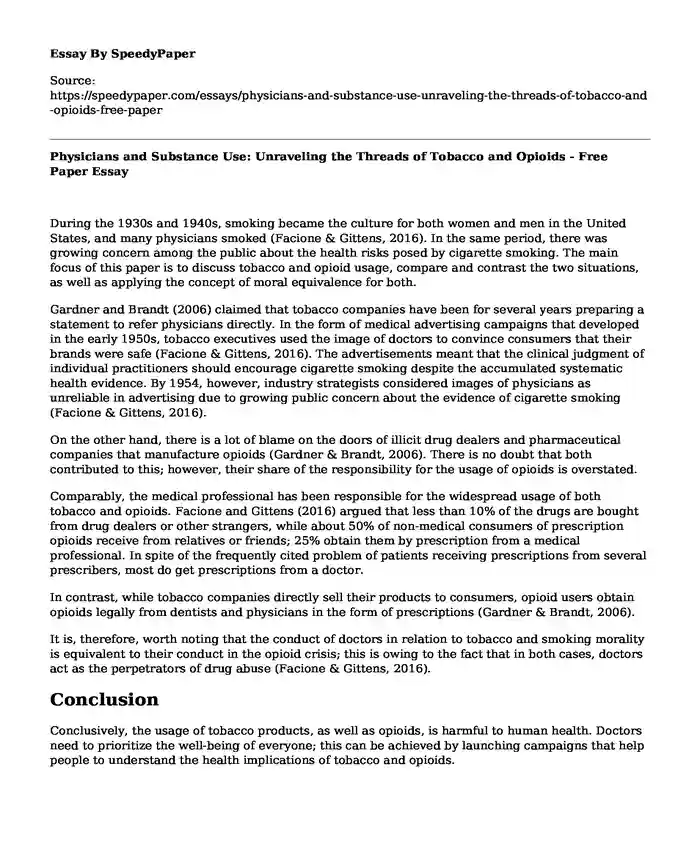
| Type of paper: | Essay |
| Categories: | Health and Social Care United States |
| Pages: | 2 |
| Wordcount: | 472 words |
During the 1930s and 1940s, smoking became the culture for both women and men in the United States, and many physicians smoked (Facione & Gittens, 2016). In the same period, there was growing concern among the public about the health risks posed by cigarette smoking. The main focus of this paper is to discuss tobacco and opioid usage, compare and contrast the two situations, as well as applying the concept of moral equivalence for both.
Gardner and Brandt (2006) claimed that tobacco companies have been for several years preparing a statement to refer physicians directly. In the form of medical advertising campaigns that developed in the early 1950s, tobacco executives used the image of doctors to convince consumers that their brands were safe (Facione & Gittens, 2016). The advertisements meant that the clinical judgment of individual practitioners should encourage cigarette smoking despite the accumulated systematic health evidence. By 1954, however, industry strategists considered images of physicians as unreliable in advertising due to growing public concern about the evidence of cigarette smoking (Facione & Gittens, 2016).
On the other hand, there is a lot of blame on the doors of illicit drug dealers and pharmaceutical companies that manufacture opioids (Gardner & Brandt, 2006). There is no doubt that both contributed to this; however, their share of the responsibility for the usage of opioids is overstated.
Comparably, the medical professional has been responsible for the widespread usage of both tobacco and opioids. Facione and Gittens (2016) argued that less than 10% of the drugs are bought from drug dealers or other strangers, while about 50% of non-medical consumers of prescription opioids receive from relatives or friends; 25% obtain them by prescription from a medical professional. In spite of the frequently cited problem of patients receiving prescriptions from several prescribers, most do get prescriptions from a doctor.
In contrast, while tobacco companies directly sell their products to consumers, opioid users obtain opioids legally from dentists and physicians in the form of prescriptions (Gardner & Brandt, 2006).
It is, therefore, worth noting that the conduct of doctors in relation to tobacco and smoking morality is equivalent to their conduct in the opioid crisis; this is owing to the fact that in both cases, doctors act as the perpetrators of drug abuse (Facione & Gittens, 2016).
Conclusion
Conclusively, the usage of tobacco products, as well as opioids, is harmful to human health. Doctors need to prioritize the well-being of everyone; this can be achieved by launching campaigns that help people to understand the health implications of tobacco and opioids.
References
Facione, P., & Gittens, C. (2016). Think critically (3rd ed., pp. 45-87). Pearson. Retrieved from https://www.academia.edu/4380069/Review_of_THINK_Critically_by_Peter_Facione_and_Carol_Ann_Gittens
Gardner, M., & Brandt, A. (2006). “The Doctors’ Choice Is America’s Choice”. American Journal of Public Health, 96(2), 222-232. https://doi.org/10.2105/ajph.2005.066654
Cite this page
Physicians and Substance Use: Unraveling the Threads of Tobacco and Opioids - Free Paper. (2023, Nov 09). Retrieved from https://speedypaper.net/essays/physicians-and-substance-use-unraveling-the-threads-of-tobacco-and-opioids-free-paper
Request Removal
If you are the original author of this essay and no longer wish to have it published on the SpeedyPaper website, please click below to request its removal:
- Mindfulness in a Professional Setting - Free Essay on Volunteering
- Essay Sample on Microsoft Queries and Clinical Services
- Free Essay Example on the Process Philosophy Identifies the Metaphysical Reality Amid Change and Dynamism
- Free Essay Sample on Nursing Practice and Healthcare
- Free Essay Sample on Ethical Considerations
- Essay Sample on Retiree Medical and Prescription Coverage
- Essay Sample on Factors Causing Maldistribution
Popular categories




